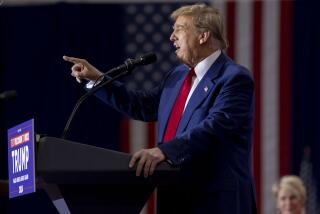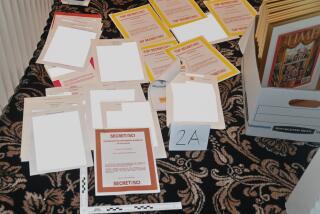Passport to Political Trickery? : State Dept. search of Clinton files raises alarms
The State Department, after thinking it over for a few days, blames “low-level people” and “mid-level clerks” for violating the department’s own regulations by issuing a rush-order investigation of Democratic presidential candidate Bill Clinton’s passport records. But this claim of anonymous bureaucratic bungling simply isn’t credible. From its inception, the Clinton records-search affair has had the smell of a political operation, and the department’s explanations have done nothing to dispel that odor. Here was a clear violation of rules of administrative procedure and a violation of the Privacy Act, a law intended to protect individual rights. Here was an unmistakable abuse of executive power.
SPED UP: Last month a number of news organization were approached by Republican operatives who hinted that politically explosive information might be found in passport and other files compiled on Clinton in the late 1960s. Several requests for access to these records were filed with the State Department under the Freedom of Information Act. The department, with a backlog of thousands of such requests, typically takes years to respond. In Clinton’s case it moved almost immediately.
Elizabeth M. Tamposi, an assistant secretary of state in charge of the Office of Consular Affairs, which handles passport matter, personally phoned U.S. embassies in London and Oslo to ask for careful searches of their files for information on the Arkansas governor. No low-level clerk, Tamposi is a political appointee with ties to John H. Sununu, the former White House chief of staff. Norbert Krieg, the consul general in the London Embassy with whom Tamposi spoke, is also a political appointee. Thus this sequence: A tip from GOP officials prompted requests to the State Department for information. Two political appointees, both holding high positions, took a personal interest in the requests, in the process riding roughshod over rules for procedures and ignoring the Privacy Act. But when the facts get out, the department lamely accuses low-level clerks of fouling up. It just doesn’t wash.
And if something that might have been used against Clinton had turned up, what then?
FED UP: If the message from the audience at Thursday night’s presidential debate in Richmond, Va., was any indication, voters have by now had their fill of personal attacks and long to hear informed discussion about the concrete problems facing the nation. That message, delivered early in the 90-minute session, may have done a lot to set the tone for the evening and make the confrontation the most informatively productive so far. True, President Bush, Gov. Clinton and Ross Perot said little that would have been new to anyone who had followed their campaigns. But the format, with essentially nonpartisan questions from voters with specific issues much on their minds, allowed the candidates to make their points in their own way, and--of no small importance--it allowed an intelligent cross section of Americans to air their concerns. The evening was one of the high points of this long campaign.
More to Read
Start your day right
Sign up for Essential California for news, features and recommendations from the L.A. Times and beyond in your inbox six days a week.
You may occasionally receive promotional content from the Los Angeles Times.






